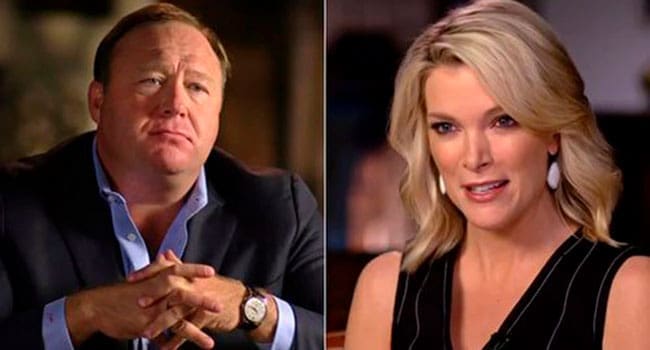 Megyn Kelly made a big splash when she left Fox News for NBC in January. Her new show, Sunday Night with Megyn Kelly, which debuted on June 4, has received fairly positive reviews for interviews with Russian President Vladimir Putin and sportscaster Erin Andrews.
Megyn Kelly made a big splash when she left Fox News for NBC in January. Her new show, Sunday Night with Megyn Kelly, which debuted on June 4, has received fairly positive reviews for interviews with Russian President Vladimir Putin and sportscaster Erin Andrews.
The upbeat reception changed in a hurry when it was announced that the show’s third instalment on June 18 would feature an interview with, of all people, Alex Jones.
Jones, a controversial, Texas-based libertarian radio host, runs a website called Infowars. He’s been called everything from an unhinged conspiracy theorist to the most dangerous individual to have ever claimed a political soapbox.
While it’s true that Jones discusses some real news stories, he also delves into preposterous rumours and innuendoes. This includes: 9/11 was an “inside job,” the rise of “human-animal hybrid chimeras” over the past 30 years, chemicals in our waters are turning “the freaking frogs gay” and, perhaps worst of all, that the Sandy Hook Elementary School massacre may have been nothing more than “synthetic, completely fake with actors.”
Jones, therefore, represents many of society’s worst elements and cheapens the nature of intellectual discourse.
That’s why some people erupted at Kelly’s decision to speak with him. They pressured NBC to scrap the interview and convinced several sponsors to drop their support for the show.
Kelly and NBC refused to give in. Even Jones’s decision to release some fascinating private audio during the negotiation period to make the host look bad before it aired (which it did, to some extent) didn’t lead to its cancellation.
It was the right call.
Jones has a huge audience (estimated at 3.5 to 4.5 million monthly listeners), and regularly attracts conservatives and libertarians. He also has the ear of U.S. President Donald Trump, although to what extent remains unclear. Trump publicly said to Jones during a December 2015 interview, “Your reputation is amazing. I will not let you down.”
Hence, Jones isn’t a bit player. It was important for Kelly to conduct this interview to expose what he is and what he represents.
Some NBC viewers were likely curious enough to listen or watch Infowars after the Kelly interview aired. That’s the risk you take. It’s also worth pointing out that people likely started discovering his rants when the controversy first erupted – which is exactly what his protesters didn’t want and Jones privately desired.
Nevertheless, many of these same viewers were likely taken aback by his zany behaviour and wild ideas during the Kelly interview. That’s why he needed to be introduced to a wider audience.
While it would be easy to ignore Jones, as others have, a true free speech supporter recognizes that all points of view, be they acceptable or reprehensible, must be tolerated, debated and challenged.
Placing restrictions on our capacity to increase knowledge or awareness is an affront to our cherished liberties and freedoms. These barriers limit intellectual curiosity. They create higher degrees of frustration, resentment and, in some cases, hatred. They occasionally lead more people down the road of self-censorship and/or refusal to engage in potentially controversial conversations.
We should want Jones to speak his mind, further marginalize his views and viewers, and dig an even bigger hole for himself. And besides, he’s acted bizarrely during other interviews (his 2013 gun control debate with Piers Morgan on CNN was a gong show, to put it mildly) so there was no reason to believe the same thing wouldn’t have happened with Kelly.
It’s entirely understandable why some Americans, including the families of those slain at Sandy Hook, were furious that a conspiracy theorist like Jones received a prime-time interview. But if they want those conspiracies to become further marginalized, they should have defended Kelly and NBC’s decision to put this freak show on air from the very start.
Michael Taube, a Troy Media syndicated columnist and political commentator, was a speechwriter for former Prime Minister Stephen Harper. He holds a master’s degree in comparative politics from the London School of Economics.
The views, opinions and positions expressed by columnists and contributors are the author’s alone. They do not inherently or expressly reflect the views, opinions and/or positions of our publication.


